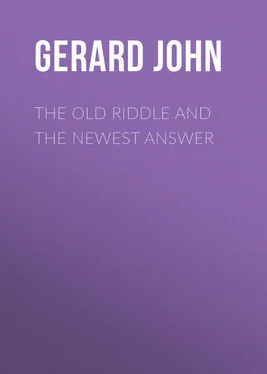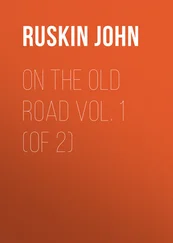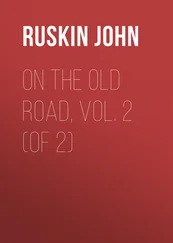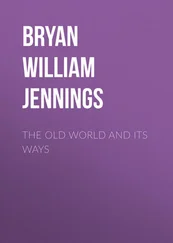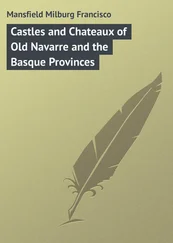John Gerard - The Old Riddle and the Newest Answer
Здесь есть возможность читать онлайн «John Gerard - The Old Riddle and the Newest Answer» — ознакомительный отрывок электронной книги совершенно бесплатно, а после прочтения отрывка купить полную версию. В некоторых случаях можно слушать аудио, скачать через торрент в формате fb2 и присутствует краткое содержание. Жанр: foreign_religion, foreign_antique, foreign_prose, на английском языке. Описание произведения, (предисловие) а так же отзывы посетителей доступны на портале библиотеки ЛибКат.
- Название:The Old Riddle and the Newest Answer
- Автор:
- Жанр:
- Год:неизвестен
- ISBN:нет данных
- Рейтинг книги:4 / 5. Голосов: 1
-
Избранное:Добавить в избранное
- Отзывы:
-
Ваша оценка:
- 80
- 1
- 2
- 3
- 4
- 5
The Old Riddle and the Newest Answer: краткое содержание, описание и аннотация
Предлагаем к чтению аннотацию, описание, краткое содержание или предисловие (зависит от того, что написал сам автор книги «The Old Riddle and the Newest Answer»). Если вы не нашли необходимую информацию о книге — напишите в комментариях, мы постараемся отыскать её.
The Old Riddle and the Newest Answer — читать онлайн ознакомительный отрывок
Ниже представлен текст книги, разбитый по страницам. Система сохранения места последней прочитанной страницы, позволяет с удобством читать онлайн бесплатно книгу «The Old Riddle and the Newest Answer», без необходимости каждый раз заново искать на чём Вы остановились. Поставьте закладку, и сможете в любой момент перейти на страницу, на которой закончили чтение.
Интервал:
Закладка:
The Pygmalions of modern days [he writes] do not require to beseech Aphrodité to animate the ivory for them. Like the savage with his Totem , they have themselves already attributed life to it… The latest phase of this peculiar non-science tells us that all Matter is alive ; or at least that it contains "the promise and potency" (whatever these may be) "of all terrestrial life." … So much for the attempts to introduce into Science an element altogether incompatible with the fundamental conditions of its existence.
In fine, to make us realize not merely how extremely narrow are the bounds of our knowledge, but even how much narrower they may be than we suppose, there enters upon the scene Radium, like the golden apple that came to disturb the harmony of the celestials. What lessons this turbulent and unconventional element will ultimately be found to teach, and how far it will revolutionize the laws of Nature as hitherto accepted, remains, of course, to be seen: but this at least is clear. In presence of it, scientific men find that they are sure of nothing they thought most certain, not of the indestructibility of matter itself, on which is based that Law of Substance which we have seen made responsible for so much.
It had been thought that whatever else might change or perish the atoms of which we have heard, as the ultimate constituents of Matter, were beyond the reach of any vicissitude. "No man," said Dalton, their discoverer, "can split an atom." Thus too Mr. Clodd, while acknowledging that the constitution even of atoms may some day be found to be liable to disorder and decay, clearly teaches that, as a practical certainty, we have in them got to something final. Taking one particular kind, an oxygen atom, as a text, he thus discourses: 58 58 Story of Creation , p. 11.
It matters not into how many myriad substances – animal, plant, or mineral – an atom of oxygen may have entered, nor what isolation it has undergone: bond or free, it retains its own qualities. It matters not how many millions of years have elapsed during these changes, age cannot wither or weaken it; amidst all the fierce play of the mighty agencies to which it has been subjected it remains unbroken and unworn; to it we may apply the ancient words, "the things which are not seen are eternal."
But now, with the recognition of radio-activity, and the disintegration of atoms into their constituent "electrons" which this is held to evidence, we have changed all that. Such disintegration, it is affirmed, must imply dissolution and death, alike of the atoms themselves and of the universe which they compose. As Sir William Crookes told the physicists assembled at Berlin, June, 1903:
This fatal quality of atomic dissociation appears to be universal, and operates whenever we brush a piece of glass with silk; it works in the sunshine and raindrops, in lightnings and flame; it prevails in the waterfall and the stormy sea.
Matter he consequently regards as doomed to destruction. 59 59 Edinburgh Review , October, 1903, p. 399.
Sooner or later, it will have dissolved into the "formless mist" of "prothyle" 60 60 Or "primal stuff." This looks remarkably like the old Materia Prima of the Schoolmen translated into Greek.
and "the hour-hand of eternity will have completed one revolution."
Consequently, we are told, 61 61 Ibid. The Revelations of Radium.
The "dissipation of energy" has found its correlative in the "dissolution of matter." We are confronted with an appalling sense of desolation – of quasi-annihilation.
It is no doubt true, here again, that such judgments cannot be called final, and that not all scientific men will accept them as they stand. But all alike are forced to agree that our previous notions are completely upset, and that we are compelled to recognize the fact that of these fundamental questions we know far less than the little we seemed to know. What, then, is to be thought of Professor Haeckel's confident utterances, which could be justified only on the supposition that we know everything? And what becomes of the famous Law of Substance, if both its parts are found thus to contradict the conclusion he would draw from it?
The case is thus summed up by the writer of the article just cited:
The discovery of radio-activity is one of the most momentous in the history of science. "There has been a vivid new start" (we again borrow Sir William Crookes' expression). "Our physicists have remodelled their views as to the constitution of matter." The remodelling indeed has hardly commenced… What is undeniable is that the Daltonian atom has, within a century of its acceptance as a fundamental reality, suffered disruption. Its proper place in nature is not that formerly assigned to it, … its reputation for inviolability and indestructibility is gone for ever. Each of these supposed "ultimates" is now known to be the scene of indescribable activities, a complex piece of mechanism composed of thousands of parts, a star-cluster in miniature, subject to all kinds of dynamical vicissitudes, to perturbation, acceleration, internal friction, total or partial disruption. And to each is appointed a fixed term of existence. Sooner or later, the balance of equilibrium is tilted, disturbance eventuates in overthrow; the tiny exquisite system finally breaks up. Of atoms, as of men, it may be said with truth, " Quisque suos patitur manes ."
"Here," in fact, "we meet the impenetrable secret of creative agency." 62 62 Ibid. , p. 398. { Note. – It is often assumed that the composite character of the atom – if fully established – must upset the Atomic Theory. This is not so; all that the new hypothesis does is to go further back in accounting for the Atomic Theory, and for all practical purposes things remain exactly as they were; except, indeed, that the dissolution of matter does away with what was held as one of the most assured conclusions of science.}
IX
THE PROBLEM OF LIFE
THE question concerning the origin and nature of Life is of supreme and vital importance not only for those who speak of Evolution as a force or principle by which everything is guided and governed, but also for such as understand by the term no more than a process which they say has actually occurred. Evolutionists of this second class disclaim, with Huxley, any "philosophy of Evolution." They are content to take the world as a going concern, at the farthest point in the past to which, even speculatively, Science can trace it, as that vast primordial nebula of which we have heard. 63 63 The Nebular Hypothesis itself is, of course, far from being an established certainty, and is not devoid of grave difficulties. Into these, however, it is not necessary now to enter.
Given this, – assuming the existence of such a nebula, constituted as they suppose, – they believe that the whole subsequent history of the world is fully explained by the uniform action of the same laws of matter which we find in operation to-day. Not only is the establishment of our Solar System, of sun and planets, to be thus accounted for, but likewise the production of life, of the organic world of plants and animals.
Hence it necessarily follows that life must originally have been evolved naturally from lifeless matter, for all are agreed that not only in the nebula, but on the earth when it first started its independent career, life did not, and could not, exist.
There has been [says Virchow] 64 64 Apud Gaynor, The New Materialism , p. 83.
a beginning of life, since geology points to epochs in the formation of the earth when life was impossible, and when no vestige of it is to be found.
If the evolution hypothesis is true, [says Huxley] 65 65 Encyclopaedia Britannica , "Biology."
living matter must have arisen from not-living matter; for by the hypothesis the condition of the globe was at one time such that living matter could not have existed in it, life being entirely incompatible with the gaseous state.
Интервал:
Закладка:
Похожие книги на «The Old Riddle and the Newest Answer»
Представляем Вашему вниманию похожие книги на «The Old Riddle and the Newest Answer» списком для выбора. Мы отобрали схожую по названию и смыслу литературу в надежде предоставить читателям больше вариантов отыскать новые, интересные, ещё непрочитанные произведения.
Обсуждение, отзывы о книге «The Old Riddle and the Newest Answer» и просто собственные мнения читателей. Оставьте ваши комментарии, напишите, что Вы думаете о произведении, его смысле или главных героях. Укажите что конкретно понравилось, а что нет, и почему Вы так считаете.
